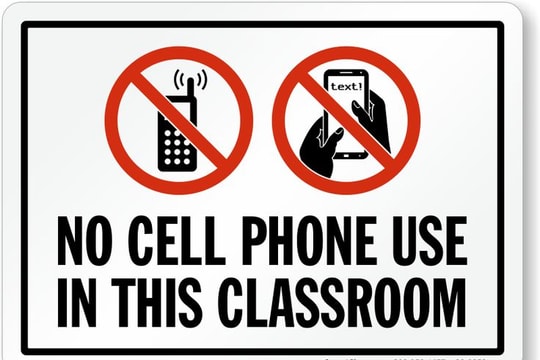Why do schools in Singapore ban phones?
With the aim of creating a more focused learning environment, Singapore schools have tightened regulations on smartphone use, to help students reduce distraction and improve learning efficiency.
The development of technology has provided students with extremely convenient learning tools. However, the use of mobile phones in educational environments poses many challenges, requiring us to consider their benefits and disadvantages.

With the aim of protecting mental health and facilitating students' comprehensive development, schools in Singapore have drastically implemented measures to limit the use of smartphones, based on increasingly clear scientific evidence on the link between phone use time and mental health problems.
Banning smartphones in schools is no longer a national issue. The United States, France, Finland, China and many others have led the way. In 2023, the United Nations called for a global ban on smartphones in schools, saying they could disrupt students’ learning and affect their mental health.
The Singapore Ministry of Education is actively looking for comprehensive solutions to manage the use of electronic devices in schools. While waiting for new regulations to be issued, many schools have proactively implemented measures such as setting up dedicated phone storage areas to help students focus on their studies.
What are schools in Singapore doing to limit students' use of phones?
Every morning, students at Queensway Secondary School (Singapore) must put their phones in a separate “locker”. This rule is to ensure that they focus fully on studying during the 6 hours at school.
The communal lockers at the front of the classroom will be used to “store” students’ phones during school hours. Teachers will monitor to ensure this rule is followed.
Ms. Audrey Chen Li Ying, Principal of the school, said that this policy, which has been applied since 2019, has received the consensus of many parents. The school will also inform parents of children in Grade 1 in detail about this policy.
Ms. Audrey Chen Li Ying shared: “Limiting the use of phones helps students focus more on their lessons and have more opportunities to interact with friends.”
Meanwhile, to ensure students focus on their studies, the Anglo-Chinese School (ACS) requires all students to keep their phones in their lockers. Violation of this rule will result in the confiscation of the device for one month.
Having spent 20 years accompanying generations of students at ACS, Ms. Fong Chee Sing, 47 years old, clearly noticed a big difference in the way students interact with each other since mobile phones became popular in schools.
“In the past, students used to chat face-to-face and play outdoor games. Now, the virtual world of video games and social networks has become the focus of their lives,” said Ms Fong Chee Sing.
At Swiss Cottage Secondary School, students were previously allowed to use mobile phones during class. However, since the end of June, the school has issued a new regulation requiring students to turn off their phones during class time and not use them during recess or lunch break.
Gina Hiu, 30, an English teacher at Swiss Cottage High School, said the new rule helps students pay more attention in class. She said students were often distracted by their phones, especially when vibrate mode was on. “They may feel the need to check notifications, even if they are not urgent.”
The school has also renovated the dining space to encourage students to talk and interact more with each other rather than just focusing on their phones. For example, the school replaced rectangular dining tables with round tables to facilitate more natural group conversations.
At Park View Elementary School, students are not allowed to use any smart devices during class time and even during recess.
School policy states that devices such as cell phones and smartwatches must be turned off and kept out of sight during all school activities. Students are only allowed to use them before or after school.
How do parents and students react to school regulations?
Although the school has strict regulations, some students still find ways to violate the regulations by submitting fake phones or using browsers on other devices to continue accessing social networks right in the classroom.
Pam Chuang, a 47-year-old parent, strongly supported the policy of restricting phone use in schools. “As an adult, I understand the temptation of constantly checking my phone, so I am glad to see the school taking measures to help our children focus on their studies,” she said.
Ms. Pam Chuang fully supports the regulation of turning off phones during school hours and believes that this will help her children focus more on their lessons, thereby achieving better academic results.
“In emergency situations, when I need to pick up my children early from school, I will call the office and the school staff will relay my message to my children,” added Pam Chuang.
Another parent, Shoba Agnetha Seetaram, 44, a mother of two, supports the restrictions on mobile phones during school hours but believes it is only part of the solution. She believes more comprehensive measures are needed to reduce children's screen time at school.
Ms Shoba stressed that a complete ban on phones is neither feasible nor a good solution. Instead, we need to find a balance between taking advantage of the benefits of technology and limiting its negative impacts.
Meanwhile, Ng Jun Yi, 14, a student at ACS, said that locking his phone has helped improve his learning efficiency. However, he also expressed his desire to use his phone during recess for entertainment.
Another student, Anand Nethra, 16, shared his change in phone usage habits. “Before, I was often distracted by my phone. But since the new policy, I have been using my phone less and I find myself focusing more on my studies,” he said.
Last July, a group of fourth-graders at Swiss Cottage Middle School came up with a brilliant idea. They stacked their phones on the lunch table during recess to encourage face-to-face conversations and build better relationships.
What do Singapore's Ministry of Education and experts say about this issue?
The Singapore Ministry of Education has shared its guidelines and recommendations on managing students’ use of electronic devices with parents through meetings and open letters. Through this, schools hope to build consensus and work closely with parents to help students develop healthy technology usage habits.
Singapore's Ministry of Education has also introduced a new rule requiring primary school students to turn off unnecessary features on their smartwatches during school hours, such as the distraction mode or airplane mode.
Meanwhile, Professor Michael Chia, a physical education and sports science expert from the National Institute of Education in Singapore, stressed the importance of schools encouraging students to develop healthy lifestyle habits, including balancing study time and screen-free free time.
“Allowing students to use smartphones and other electronic devices at school can lead to them being drawn into the virtual world, leading to overuse, leaving them less time for physical activity, face-to-face social interaction and other real-life experiences,” said Professor Michael Chia.
“Children and young people need to experience life more fully. Instead of just focusing on screens, they need to spend time exploring the world around them, nurturing their dreams, playing with friends and participating in extracurricular activities,” Mr. Michael Chia emphasized.





